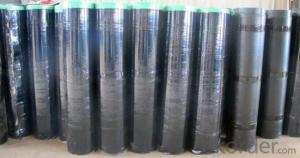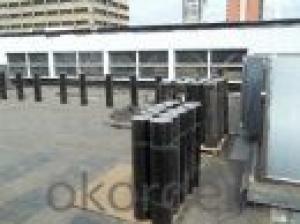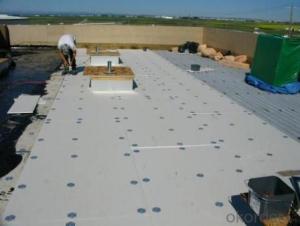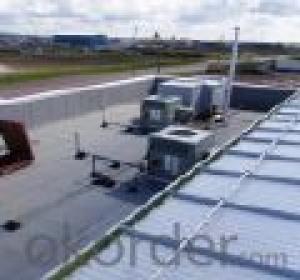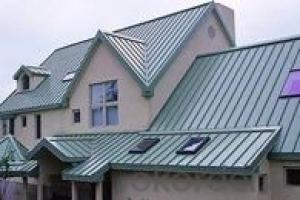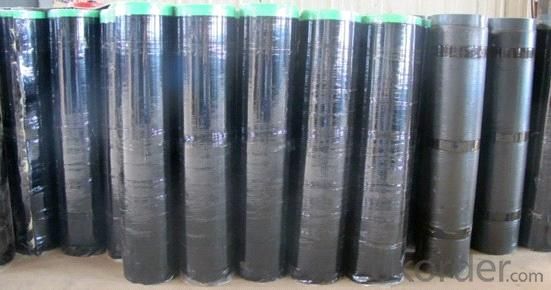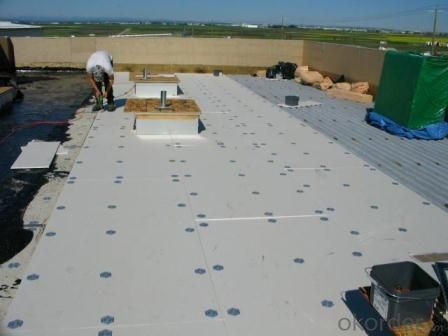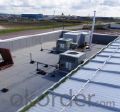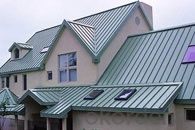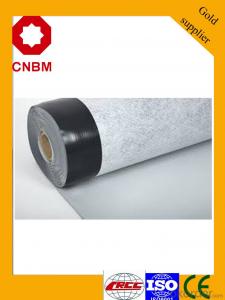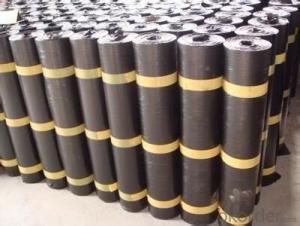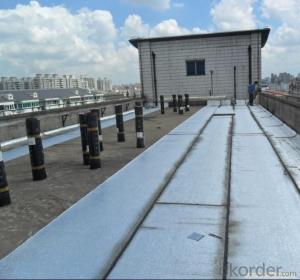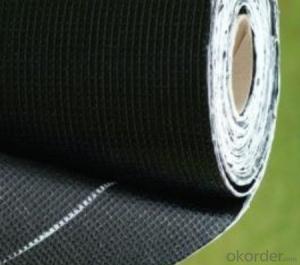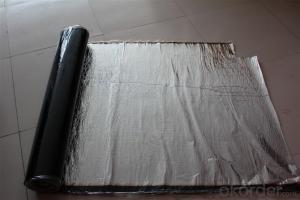SBS Waterproof Material Self Adhesive Aluminium Membrane
- Loading Port:
- Shanghai
- Payment Terms:
- TT OR LC
- Min Order Qty:
- 1000 m²
- Supply Capability:
- 200000 m²/month
OKorder Service Pledge
OKorder Financial Service
You Might Also Like
Product description
SBS Waterproof Material Self Adhesive Aluminium Membrane is produced with SBS elastomer and bitumen as raw materials, using polyethylene film.
Aluminium foil coated on the upward or no file(both side self-adhesive) while self-adhesive protection layer on the downward
surface.It has a widely prospect new contruction waterproof materials. Good self-adhesion, no leaking,cold flexibility,especially
in self-adhesion. That is unque product in waterproof and application.
Packaging & Shipping
use advanced equipment to produce 2 meters WSBS Width Elastomeric Modified Bitumen Waterproofing Membrane which is made of bitumen modified with Styrene-Butadiene-Styrene (SBS) as dipping and painting. Its upper surface covers PE membrane and color sand or schist, and lower surface is made of isolation material. Products correspond to the national standards GB18242-2008(elastomeric modified bitumen waterproofing membrane).
Package and transportation-- SBS waterproof membrane / APP waterproof membrane / Asphalt waterproof membrane for building waterproofing construction :
1. Torch on bitumen membrane sheets 4mm should be stored under dry and ventilated conditions.
2. Different types of membranes must be piled separately.
3. Under usual condition, storage period is one year since production date.
4. Membrane roll should be put vertically during transportation. It should be kept away from sunshine and rainwater.
.
Advantagee
1.1m or 2m width, we can produce as your requirment
2.Simple and Efficient Construct, Greatly Saving Construct Period
3.Advanced Production Line
4.Excellent Comprehensive Physical Properties
5.Stable Dimension
6.Wide Adaptability of Facing Material
7. Cold-applied construction with no open flame and self-adhesion without bonding agent make it safe, low- carbon, environmental, and economical.
8. Excellent adhesive performance guarantees the integrity of waterproof layer.
9. Good rubber elasticity, elongation and shear stress.
10. Good low-temperature property.
Application method
1) Widely used in the industrial and civil building roofing, underground, pool, tunnel, wooden and metal roofing.
2) Specially applied in the oil depot chemical factory, garment factory, and granary.
3) Especially used in cold places.
4) Tape used for sealing all construction material surfaces.
Our Services
1.If you need some advises for the waterproof construction, we have the best engineer to serve you.
2.We send the free samples to you by freight collect.
3.We will guarantee the quality and the competitive price.
4.We will give you the best packaging and safe shipping.
5.If any problem, we will always be right here waiting for you.
Storage:
Different types or specifications of products should be separated, not mixed.
Keep it dry and ventilated, protected from the sun or rain.
Storage temperature should never be higher than 45 °C. Pile up the membranes flatwise whose stockpile height never exceeds five layers. One layer is guaranteed if it is placed vertically.
Prevent it from inclination or In the process of transportation, it should be lying in case of inclination or lateral pressure. If necessary, cover it with felt-cloth.
Storage time is at least one year from manufacture date on if the product is under normal operation of storage.
Technical Parameters
Item | Index | ||||||
1 | Thickness of resin layer of the middle fabric ,mm≥ | - | - | 0.40 | 0.40 | 0.40 | |
2 | Tensile performance | Max tensile strength,N/cm ≥ | - | 120 | 250 | - | 120 |
Tensile strength,NPa ≥ | 10 | - | -10 | - | - | ||
Max elongation% ≥ | - | - | 15 | - | - | ||
Breaking elongation % ≥ | 200 | 150 | - | 200 | 100 | ||
3 | Heat treatment size change rate%≤ | 2.0 | 1.0 | 0.5 | 0.1 | 0.1 | |
4 | Cold bonding | -25°c No cracks | |||||
5 | Watertightness | 0.3mPa,2h waterproof | |||||
product show
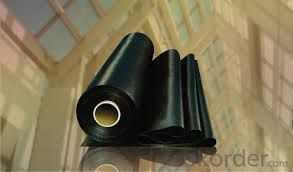
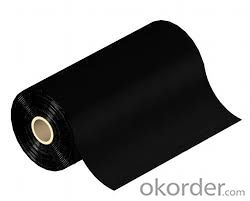
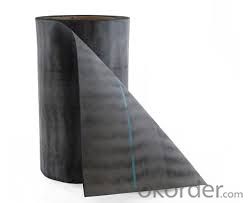
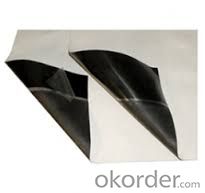
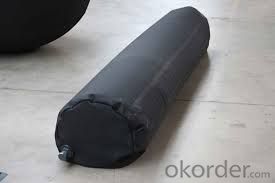
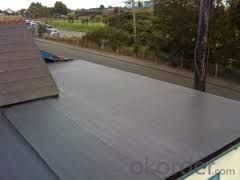
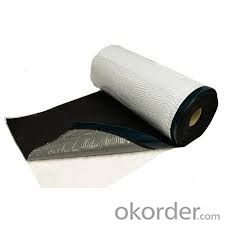

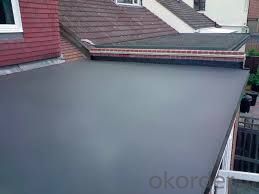
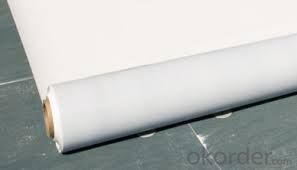
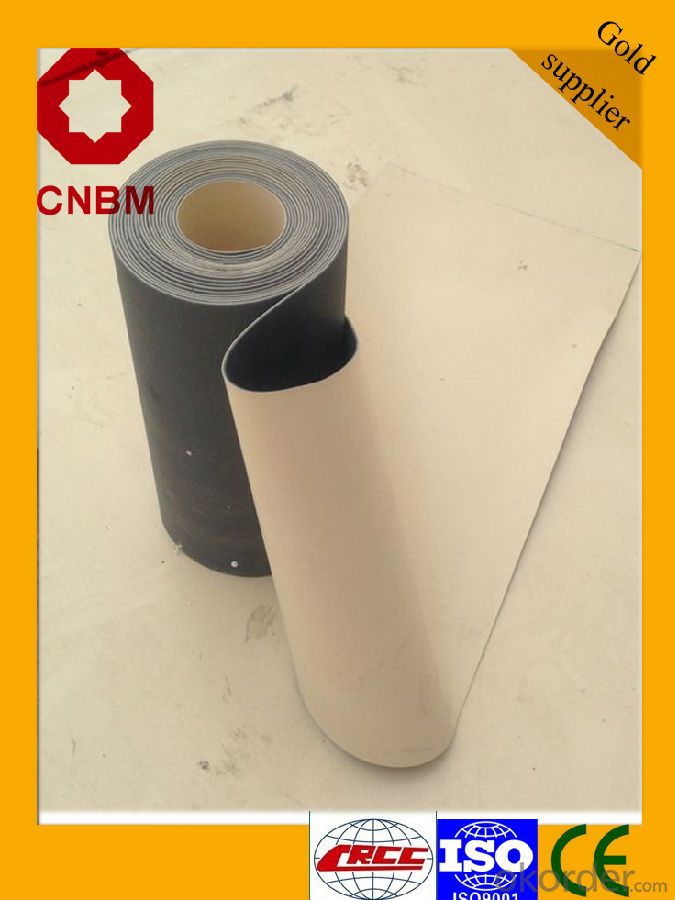
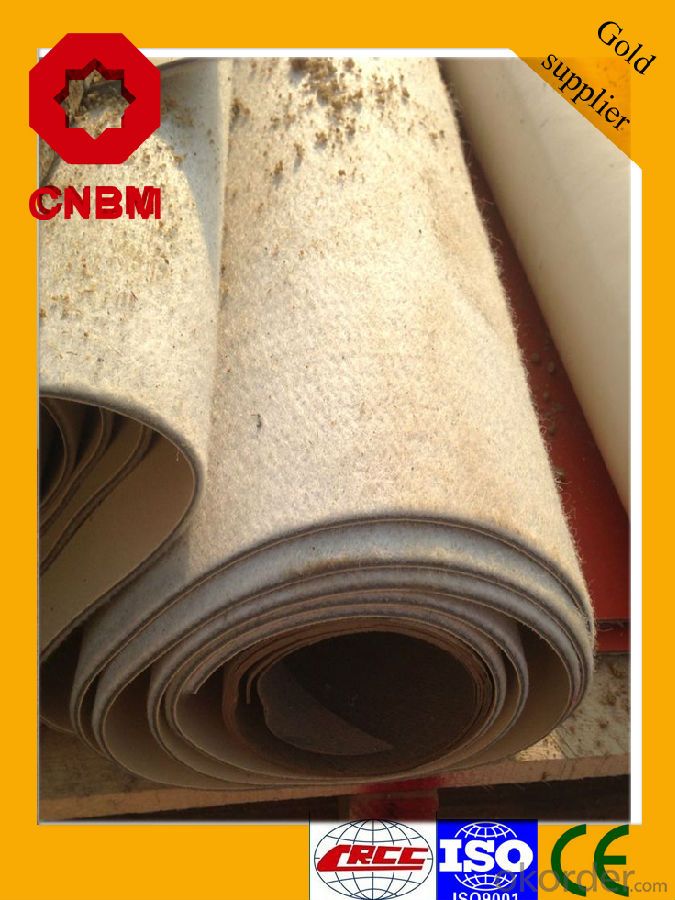
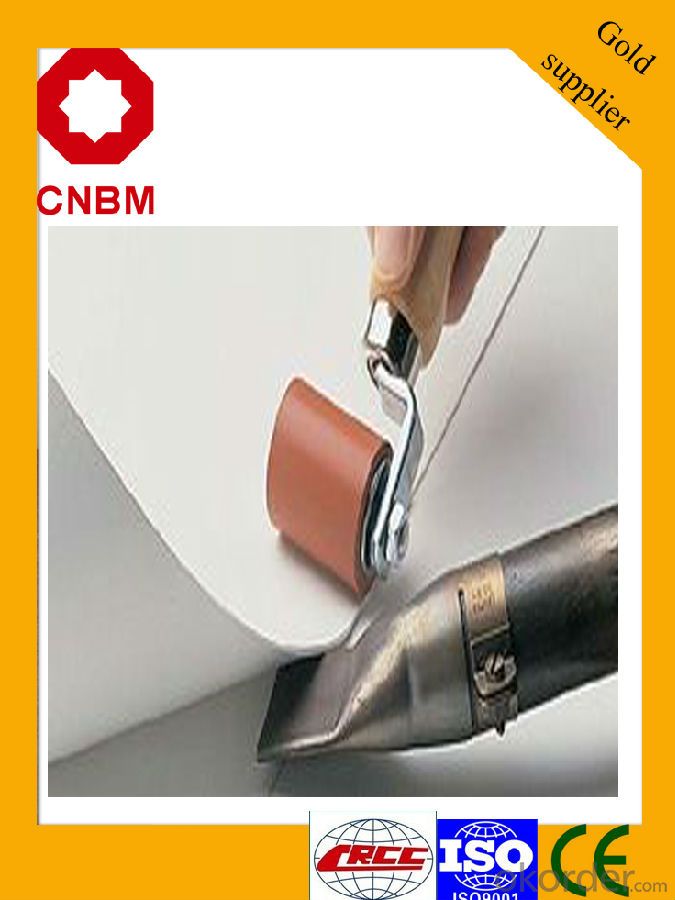
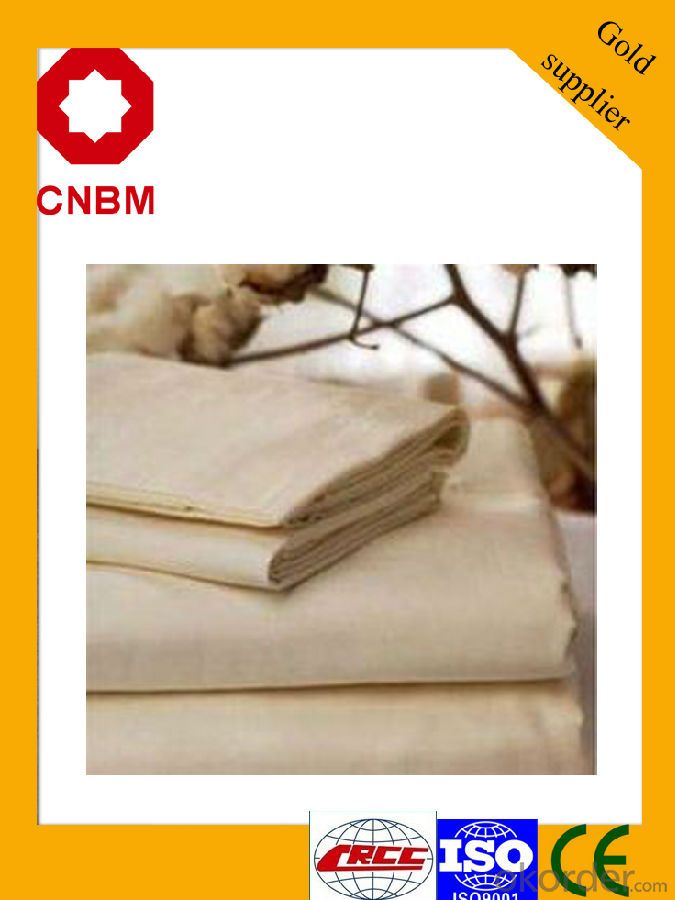
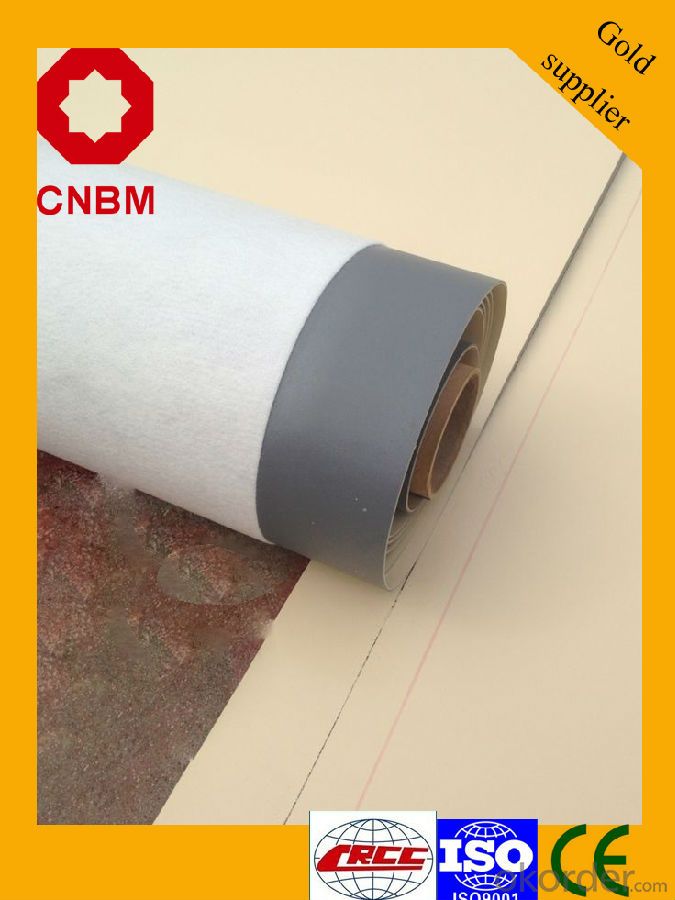
FAQ
Q: What's the de6abf1fe186f8d58506cbcfe46eed814d.jpglivery time ?
A: 3-5 days for 1-600 rolls, 10-15 days for container.
Q: What's the payment terms ?
A: TT/LC
Q: How do you make replacement with quality problems ?
A: New replacement will be packed into your next order or send to you directly after receive video or photo about quality problems.
- Q: Can a waterproofing membrane be used in areas with extreme weather conditions?
- Yes, a waterproofing membrane can be used in areas with extreme weather conditions. Waterproofing membranes are designed to provide protection against water intrusion and can withstand a wide range of weather conditions, including extreme heat, cold, heavy rainfall, and snow. These membranes are made from durable materials that are resistant to UV rays, temperature fluctuations, and other environmental factors. Additionally, some waterproofing membranes are specifically designed for use in areas with extreme weather conditions, offering enhanced performance and durability. It is important to choose a waterproofing membrane that is suitable for the specific weather conditions of the area to ensure long-lasting and effective protection.
- Q: Can a waterproofing membrane be used in renovation projects?
- Yes, a waterproofing membrane can definitely be used in renovation projects. In fact, it is often a crucial component in ensuring the longevity and durability of the renovated structure. Waterproofing membranes are designed to create a barrier against water infiltration, protecting the building from potential water damage and leaks. During renovation projects, it is common to encounter areas where water resistance is important, such as basements, bathrooms, showers, balconies, and roofs. Applying a waterproofing membrane in these areas can help prevent moisture problems, mold growth, and structural damage caused by water seepage. Furthermore, waterproofing membranes can be used in various types of renovation projects, including residential, commercial, and industrial. Whether it is a small-scale bathroom renovation or a large-scale commercial building refurbishment, utilizing a waterproofing membrane ensures enhanced protection against water-related issues. Moreover, waterproofing membranes come in different forms, such as liquid-applied membranes, sheet membranes, and cementitious coatings. These options provide flexibility in choosing the most suitable membrane for a specific renovation project, considering factors like budget, substrate, and desired level of waterproofing. In summary, a waterproofing membrane is an essential element in renovation projects, as it helps safeguard against water damage and ensures the longevity of the renovated structure. By using a waterproofing membrane, owners can have peace of mind knowing their renovated space is well-protected against potential water-related issues.
- Q: Can a waterproofing membrane be used in areas with extreme weather conditions, such as hurricanes or snowstorms?
- Yes, a waterproofing membrane can be used in areas with extreme weather conditions, such as hurricanes or snowstorms. Waterproofing membranes are designed to provide a protective barrier against water infiltration and can effectively withstand various weather conditions. They are made from materials that are resistant to moisture and can be installed in different areas like roofs, basements, or foundations. In regions prone to hurricanes, waterproofing membranes can help prevent water damage by creating a barrier that keeps water out even during heavy rainfall or storm surges. These membranes are often reinforced and have high tensile strength to withstand the strong winds and pressure associated with hurricanes. Similarly, in areas with heavy snowstorms, waterproofing membranes can help prevent water intrusion caused by melting snow or ice dams. They are designed to be flexible and resistant to extreme temperatures, ensuring that they maintain their integrity and prevent leaks even in freezing conditions. However, it is important to choose the right type of waterproofing membrane suitable for the specific weather conditions in the area. Different membranes have varying levels of resistance to extreme weather, so it is advisable to consult with a professional to determine the most appropriate membrane for the specific climate and weather patterns. Additionally, proper installation and regular maintenance are crucial to ensure the longevity and effectiveness of the waterproofing system in extreme weather conditions.
- Q: Can a waterproofing membrane be used in conjunction with paint or coatings?
- Yes, a waterproofing membrane can be used in conjunction with paint or coatings. In fact, combining a waterproofing membrane with paint or coatings is a common practice in many construction and renovation projects. The waterproofing membrane provides a barrier against moisture and prevents water infiltration, while the paint or coatings add aesthetic appeal and can provide additional protection against UV rays, weathering, and chemical exposure. By using both in conjunction, you can achieve a dual-layer protection system that ensures long-lasting durability and water resistance. However, it is essential to ensure compatibility between the waterproofing membrane and the paint or coatings to avoid any adverse reactions or loss of effectiveness. Consult with a professional or manufacturer guidelines to determine the best combination and application process for your specific project.
- Q: Can a waterproofing membrane be installed by a DIYer?
- Yes, a waterproofing membrane can be installed by a DIYer. However, it is essential to follow the manufacturer's instructions carefully and have a basic understanding of the process. Additionally, the DIYer should possess the necessary skills and tools required for the installation. It is advisable to conduct thorough research and consider the complexity of the project before attempting it as improper installation can lead to ineffective waterproofing.
- Q: Are waterproofing membranes suitable for high-traffic areas?
- Waterproofing membranes prove to be an ideal solution for areas with high foot traffic. Their purpose is to create a barrier against water infiltration, safeguarding the structure and preventing water-related harm. It is worth noting that high-traffic zones like walkways, driveways, parking lots, and other heavily frequented spaces are at risk of continuous exposure to water, resulting in structural damage and gradual deterioration. By employing waterproofing membranes in these areas, water penetration is effectively thwarted, guaranteeing their resilience and longevity. Furthermore, these membranes are often engineered to be slip-resistant, adding an extra layer of safety in high-traffic zones. Consequently, implementing waterproofing membranes in such areas is a prudent decision to address water-related concerns, preserve the structural integrity of the space, and ensure the safety of its occupants.
- Q: Can a waterproofing membrane be used for water fountains or decorative features?
- Water fountains and decorative features can benefit from the use of a waterproofing membrane. These membranes are specifically designed to create a protective barrier against water penetration and can be applied to various surfaces, including those found in water fountains and decorative features. The materials used to make these membranes, such as rubber, bitumen, or liquid-applied coatings, possess excellent waterproofing properties. By applying a waterproofing membrane, you can effectively prevent water from infiltrating the underlying structure and causing damage. This is particularly crucial for water fountains and decorative features, as they are constantly exposed to water. Moreover, waterproofing membranes can also play a role in averting leaks, cracks, and other potential issues that may arise from water exposure, thereby extending the lifespan of the fountain or decorative feature.
- Q: Can a waterproofing membrane be used on drywall surfaces?
- Indeed, it is possible to utilize a waterproofing membrane on surfaces composed of drywall. Drywall, being a material with porosity, is prone to damage caused by moisture, particularly in areas that are inclined to high levels of humidity or exposure to water, such as bathrooms or basements. The application of a waterproofing membrane on drywall aids in the creation of a protective barrier against moisture, thereby preventing the infiltration of water and potential harm. This membrane can be implemented either as a liquid coating or as a sheet membrane directly applied onto the drywall surface. It is of utmost importance to adhere to the instructions provided by the manufacturer and guarantee a proper installation, as this will result in effective waterproofing and safeguard the drywall from issues associated with moisture, such as the growth of mold, mildew, and rot.
- Q: Can waterproofing membranes be used on stormwater management systems?
- Yes, waterproofing membranes can be used on stormwater management systems. Waterproofing membranes are commonly used to prevent water infiltration and protect structures from water damage. In the case of stormwater management systems, which are designed to capture, store, and manage rainwater runoff, waterproofing membranes can be used to create a watertight seal and prevent leaks or seepage. Stormwater management systems often include components such as retention ponds, infiltration basins, or underground storage systems. These components need to be properly sealed to ensure that the collected stormwater is contained and managed effectively. Waterproofing membranes, when installed correctly, can provide an impermeable barrier that prevents water from escaping or infiltrating the system. Using waterproofing membranes on stormwater management systems offers several benefits. Firstly, it helps to maintain the integrity and functionality of the system by preventing leaks or seepage that may compromise its performance. This ensures that the stormwater is effectively captured and managed, reducing the risk of flooding or erosion. Additionally, waterproofing membranes can extend the lifespan of stormwater management systems by protecting them from water damage. Water infiltration can lead to structural deterioration, corrosion, or the growth of mold and mildew, which can all weaken the system over time. By creating a waterproof barrier, the membranes help to preserve the structural integrity of the components, increasing their longevity and reducing maintenance requirements. Furthermore, using waterproofing membranes on stormwater management systems can also contribute to environmental sustainability. By effectively containing and managing stormwater runoff, these systems help to reduce water pollution and improve the quality of natural water bodies. Waterproofing membranes play a crucial role in preventing stormwater from carrying pollutants, such as chemicals or sediment, into rivers, lakes, or oceans. In summary, waterproofing membranes can be used on stormwater management systems to create a watertight seal, prevent leaks, and protect the components from water damage. By providing an impermeable barrier, these membranes help to maintain the functionality and integrity of the system, extend its lifespan, and contribute to environmental sustainability by reducing water pollution.
- Q: Can a waterproofing membrane be used for planter boxes and green roofs?
- Yes, a waterproofing membrane can be used for planter boxes and green roofs. In fact, it is highly recommended to use a waterproofing membrane in these applications to prevent water leakage and damage to the underlying structures. Planter boxes and green roofs often require a reliable waterproofing system to ensure the longevity and functionality of the design. A waterproofing membrane acts as a barrier, preventing water from seeping into the underlying structures and causing potential damage. For planter boxes, a waterproofing membrane is essential to prevent water from leaking out and damaging the surrounding structures. It also helps to retain the moisture within the planter box, ensuring that plants receive adequate hydration. Similarly, green roofs require a waterproofing membrane to prevent water from infiltrating the roof structure and potentially causing leaks or structural damage. The membrane acts as a protective layer, ensuring that water is properly drained and does not accumulate on the roof surface. When selecting a waterproofing membrane for planter boxes and green roofs, it is important to consider factors such as durability, flexibility, and resistance to root penetration. Some membranes are specifically designed for these applications, providing additional features like root barriers to prevent plant roots from penetrating and damaging the membrane. In conclusion, a waterproofing membrane is an essential component for planter boxes and green roofs. It helps to prevent water leakage, retain moisture, and protect the underlying structures from potential damage caused by water infiltration.
Send your message to us
SBS Waterproof Material Self Adhesive Aluminium Membrane
- Loading Port:
- Shanghai
- Payment Terms:
- TT OR LC
- Min Order Qty:
- 1000 m²
- Supply Capability:
- 200000 m²/month
OKorder Service Pledge
OKorder Financial Service
Similar products
Hot products
Hot Searches
Related keywords
